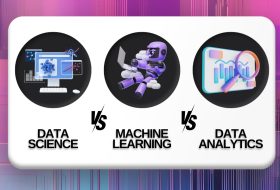Skill development has become more essential than ever in the present employment conditions, especially in India. Whether you are looking to begin your professional journey or seeking to progress in your current field, building the appropriate mix of technical, subject-specific, and soft skills can enhance your job prospects considerably. Industries such as Banking, Financial Services, Insurance, Data Science, Hospitality, Digital Marketing among others offer rich possibilities for skill enhancement. Each of the mentioned industries require a combo of specialized knowledge couples with personal capabilities.
Through this article, we are focusing on the various competencies encompassing subject skills, technical skills, and soft skills that can help individuals succeed.
Career Growth 2025: Key Skills to Thrive in Emerging Industries
1. BFSI industry
Banking Financial Services and Insurance industry is the backbone of global economic transactions. There is an unceasingly expanding need for professionals adept in the financial services knowledge. Aspiring learners and professionals need to develop both technical knowledge and soft skills to thrive in this industry. Please find a breakdown of major skills:
- Financial analysis: You need to have an understanding of assessing financial statements, evaluating investments, and making data-driven financial decisions.
- Risk management: It is essential to develop knowledge of managing financial risks through various strategies like hedging, insurance, and diversifying portfolios.
- Regulatory compliance: Familiarize yourself with financial regulations like AML (Anti-Money Laundering), KYC (Know Your Customer), and others to make sure businesses follow legal and ethical guidelines.
- Financial modeling: Having expertise in financial modeling with the help of software such as Excel and tools like Python or R to predict financial patterns is a key to financial analysis.
- Data analysis: Interpreting and analyzing financial datasets by implementing SQL, Python and visualization tools including PowerBI or Tableaeu is also a valuable skill in the BFSI industry.
- Attention to detail: In the financial industry, accuracy and attention to detail is extremely important as you are managing finances for the public. Here, even small mistakes can have large consequences.
- Problem-solving abilities: You should have a knack of identifying problems and their suitable resolutions. This skill is valued very high in the industry, escpecially by the customers.
- Effective communication: Professionals must communicate complex financial concepts clearly to clients, colleagues, and stakeholders.
2. Data Science
Data Science is a very exciting domain which is also rapidly expanding at present. The field of Data Science requires a blend of technical acumen and analytical expertise. Businesses are constantly searching for professionals who are expert in deriving suitable business insights from vast datasets to drive growth. Here are the necessary skills required in this field:
- Statistics and probability: These subjects form the core of Data Science as they helps professionals to analyze and interpret the hidden patterns in the data effectively and predict the future trends.
- Machine learning: Another core skill is machine learning. It is important to understand the working behind ML algorithms and their applications to practical business scenarios.
- Data visualization: The ability to visualize intricate datasets utilizing tools such as Tableau, PowerBi, or matplotlib makes it very convenient and easier to present the outcomes to stakeholders.
- Data cleaning and pre-processing aspects: The data generated is often raw and messy. As a data science aspirant, you need to first develop the knowledge of cleaning the data and its transformation. Thus,data preparation for further analysis is a pivotal aspect that every individual aspiring to become data scientist should develop.
- Programming languages: This is another important aspect of data science is the learning and implementation of programming languages like Python, R, and SQL. This is essential for working with data and developing algorithms.
- Big data and cloud technologies: In addition to the above competencies, try to gain familiarity with tools like Hadoop, Spark, Scala, Kafka and cloud platform services such as AWS, Azure and GCP. This are in-demand skills right now for data science professionals, to handle large datasets efficiently,
- Collaboration: Several data science projects often require teamwork. Hence, being able to work effectively with others, especially cross-functional departments, is key.
- Enterprise thinking: The ability to approach enterprise problems analytically, seek the right questions, and make decisions based on data insights is essential for a data science professional.
3. Cybersecurity
Organizations are feeling the urge to hire cyber experts, thanks to the monumental advancements in the digital space. Cyber professionals are required to protect sensitive information, networks, digital assets and systems from cyber threats. Skills to excel in this area:
- Network security: As a cyber expert, you need to understand the fundamental process of network protection from unauthorized access, viruses, and attacks.
- Cryptography: It is also beneficial to gather knowledge behind encryption algorithms and secure communication protocols as this is key to safeguarding sensitive data.
- Incident response skill: Being able to quickly and efficiently respond to cybersecurity incidents and minimize damage is a vital skill to have.
- Firewall protection management: As a cyber expert, your routine may involve competencies including configuring and managing firewalls to block unauthorized access.
- Penetration testing: Companies are inducting ethical hackers to test the security of networks and systems. Hence, elevating the knowledge of tools such as Metasploit, Burp Suite, and Kali Linux is really beneficial.
- Malware analysis: The ability to understand and analyze malicious software to prevent it from spreading within systems.
- Eye to detail: The field of cybersecurity requires a keen eye to detail to identify potential vulnerabilities and the ability to detect irregularities.
- Emulate an attacker’s mindset: Identifying system weaknesses and finding appropriate solutions to prevent security breaches requires you to think like cyber attackers.
4. Digital Marketing
The digital marketing industry is swiftly evolving, and businesses are in the search for digital marketers who can create, manage, and analyze online marketing campaigns. Here are few essential skills to navigate in the digital marketing world:
SEO (Search Engine Optimization): SEO skills holds prime importance in digital marketing and it deals with the optimization of websites and related content. Learning SEO helps in making the content and eventually the website to rank higher on search engines.
Social media marketing: Creating successful media campaigns is another aspect of digital marketing. It helps in engagement with audience across platforms like Facebook, Instagram, and LinkedIn.
Content creation: You can excel in the digital marketing field if you have the ability to write impressive content, whether written, visual or video.
Google analytics: Knowledge of tracking and analyzing the website traffic, conversion rates, and user behaviour helps refine marketing strategies.
- Email-marketing: It is vital to have expertise in designing, sending, and analyzing email marketing campaigns for engagement and customer retention.
- PPC (Pay-Per-Click) advertising: Develop proficiency in creating and managing PPC campaigns using Facebook ads, google ads, or other platforms to boost the online visibility of the businesses.
- Evaluative thinking: The ability to analyze data and derive decisions based on insights is critical for successful campaigns.
- Building partnerships: The key to delivering comprehensive marketing strategies lies in building great partnerships with other teams, such as sales, design, and content.
5. Hospitality Industry
Hospitality is another exciting and lively industry which is not only diverse but fast paced as well. It requires a blend of customer-focused skills and operational expertise. Please find the necessary skills if you are interested in working in hotels, event planning, or tourism space:
- Customer service: Offering superlative service and anticipating the needs of customers is at the heart of hospitality. Mastering customer service skills is paramount if you want to succeed in the hospitality industry,.
- Event management: Develop an understanding of organizing and managing events, from weddings to corporate meetings.
- Food and beverage management: This involves managing food and drink operations, including inventory, cost control, and customer satisfaction.
- Property management systems: Make yourself acquainted with systems like Opera or Maestro that help you to manage bookings, check-ins, and other operations.
- Reservation systems: Proficiency with tools like OpenTable or Booking.com is important for managing customer reservations effectively. Practice simulation based systems for getting hands-on experience for efficient reservations.
- Data analytics: Interpreting customer data and using it to improve services, from personalized experiences to pricing strategies, is invaluable in the hospitality management.
- Better communication: A strong communication is essential for interacting with customers, vendors, and colleagues. Hence, learning verbal and written communication helps you in effective communication.
- Adaptability: The ability to handle unexpected situations is vital in the hospitality industry. Scenarios like last-minute changes or difficult customers demand you to be adaptable and act according to the circumstances.
- Teamwork: It is important to develop associations with others, from housekeeping staff to event coordinators, which ensures smooth operations.
6. Hospital Management
The field of hospital management involves handling operations of healthcare facilities. Managers in healthcare services are responsible to make sure that all functions run smoothly. They ensure streamlined coordination between staff, resources, and services to guarantee patients receive high-quality care. Some of the skills that matter most are:
- Healthcare regulations: You need to understand local and global healthcare laws, compliance issues, and patient rights. This is essential for hospital managers.
- Operations management: Acquiring knowledge of managing hospital operations, including staffing, budgeting, and resource allocation, is key for a successful career in hospital management profession.
- Learning the economics of Healthcare: A thorough understanding of the financial aspects of healthcare, such as budgeting, cost control, and billing, helps in ensuring sustainability within the industry.
- Healthcare IT systems: It is important to develop familiarity with Electronic Health Records (EHR), hospital management software, and patient data systems.
- Data analysis: Data analysis skills are also important to enhance patient care, reduce costs, and streamline operations.
- Medical billing and coding: Gather knowledge of healthcare billing and coding systems to ensure accurate and efficient claims processing.
- Leadership: Hospital industry aspirants need strong leadership skills to guide medical staff, resolve conflicts, and ensure premium quality healthcare.
- Empathy: It is essential to develop a compassionate approach while dealing with patients, families, and staff members in the healthcare environment.
- Problem-solving skills: Developing the ability to address unexpected challenges, from staffing shortages to patient complaints, is critical in hospital management.
7. Retail and Sales
The retail/sales business process primarily involves selling products and services to consumers where the activities can be performed both physically and virtually. It is also one of the industries that constitute most of the economic development of any country. The industry requires specialists who can be proactive and embrace technology in order to keep up with the changes in the marketplace and moods of the consumers. To perform effectively undertaking occupations in sales and retail, professionals require the interplay of technical skills, subject-specific skills, and social skills. We have mentioned some of these skills below:
- In the retail industry, you must gain a good understanding in point-of-sale systems, Customer Relationship Management software, and inventory management tools to succeed.
- Making informed decisions and optimizing sales performance based on data and related information is also essential.
- Data analysis: Develop the ability to use data analytics to track sales trends and customer behaviour.
- Product knowledge: Having a deep understanding of the products being sold is also crucial in retail industry
- Market trends: Awareness of current trends and evolving consumer needs.
- Consumer behaviour: Gaining knowledge of target audience preferences and buying habits.
- You also need to keep up with the latest industry trends and competitor strategies.
- Communication skills: This is the key for interacting with customers and building relationships.
- Negotiation skills: Very essential aspect of the retail and sales industry is to have good negotiation skills. It is useful while closing deals and driving sales.
- Problem-solving abilities: This is important for addressing customer concerns and ensuring satisfaction.
- Teamwork and a positive attitude: Develop an understanding of teamwork and contribute to a supportive work environment and excellent customer service.
Conclusion
The process of skill development is an ongoing journey. Develop the right set of skills for career growth in any industry. Irrespective of whether you are interested in Banking, Data Science, Cybersecurity, Hospitality, Hospital Management, Retail and Sales or Digital Marketing, understanding the combination of subject skills, technical skills, and soft skills required in each field can help you build a successful and fulfilling career. Try to focus on your technical knowledge and interpersonal abilities. This will ultimately help to position you as a comprehensive professional ready to take on the obstacles of the modern workforce.










